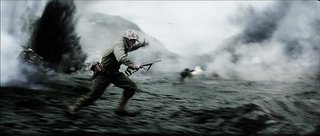Clint Eastwood: A Reappraisal

Since 2003 Clint Eastwood has been on the upswing. With his masterful Mystic River Eastwood delivered when it most mattered. A sober, contemplative and ultimately compelling saga of revenge, death and childhood Mystic River proved to be a watershed in Eastwood's illustrious career. I don't say this lightly, mainly because Eastwood is responsible for such classics as Unforgiven and The Outlaw Josey Wales.
Mystic River also came at a time when Eastwood's relevance in Hollywood was being questioned. At the ripe old age of 73, here was a director who just thought new and adapted the novel into something more than just an adaptation, an appropriation. Fuelled by sterling performances from all concerned, I consider Mystic River to be one of the greatest films this side of the century.
Of course, Eastwood followed this up with the Oscar winning Million Dollar Baby. While not quite as visceral, intense, somber or free flowing as Mystic River, Million Dollar Baby meant that Eastwood was now on par with Scorsese amongst others. Scorsese who has never won an Oscar (and rightfully so, his films are far better than what is necessary for Oscar consideration) had quite a good chance with the hap hazard film The Aviator. As time proved, Eastwood triumphed with both Best Director and Best Picture. Unfortunately Eastwood never got recognised for his great work and this is no different.
Eastwood's latest two films Flags of Our Fathers and Letters From Iwo Jima look set to take him further up the ladder of masterful directors. If story and trailers are to be believed these two could be some sort of poetic masterpieces. Both forming a meditation on love, loss and war; they are shot two show both the American and Japanese perspectives of that fateful encounter 60 or so years ago. Eastwood's decision to opt for two films shows his daringness to extend himself and his American compatriots beyond the childish scope of narrow patriotism.
The splendidly bleached out cinematography along with the most beautiful (dare I say minimalist?) soundtrack I have heard in quite a while could, if Eastwood has done his job, elevate these two films into exospheric (hey come on, it is higher than the stratosphere) territory. The amount of effort Eastwood has put in while being 76 in appluadable and with Spielberg as his Producer, things could go right completely.
Eastwood specifically used unknown actors in this film and the lack of star appeal is one of the films biggest boons. We are not going to watch someone play the soldiers, we are going to watch the soldiers. Could this film have philosophical questions abound? Could it connect with Nietzsche or perhaps Freud? Time will tell. Of course, I could be completely wrong and find these two films to be a good waste of however million dollars it is. Somehow I doubt that.